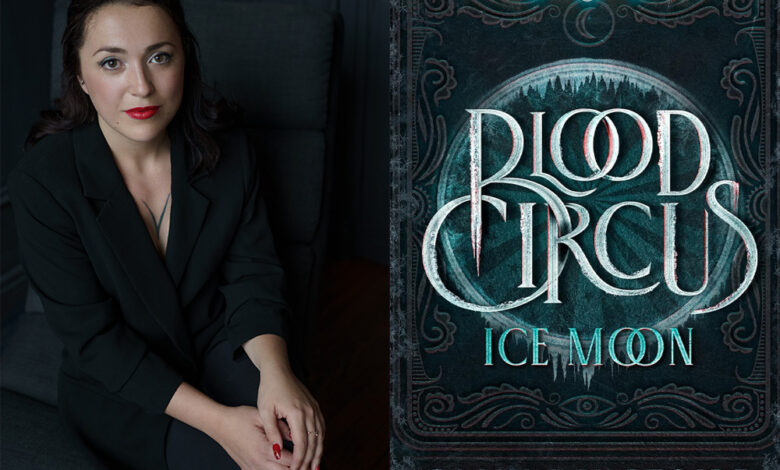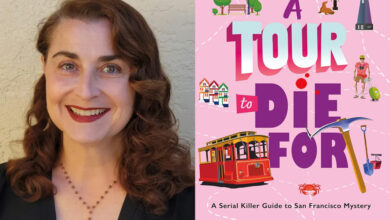Q&A: Camila Victoire, Author of ‘Ice Moon’

We chat with author Camila Victoire about Ice Moon, which pulls readers deeper into a world of primal rituals, sentient plants, earth magic, and savage beauty in this sequel to Blood Circus.
Hi, Camila! Can you tell our readers a bit about yourself?
Hi!! Of course—
I was born in Montreal, grew up in Australia, and when I turned eighteen, I ran away with a circus—literally. What was meant to be a gap year turned into seven, and I traveled across Europe, the US, Canada, Mexico, Australia, and the Middle East.
Eventually, I left the circus to study screenwriting in Vancouver, and after graduating I moved back to Montreal, where I’ve been ever since.
Outside of writing and traveling, I love dogs (I have two Newfies that weigh 250lbs combined), nature, trekking, and pole dance/circus arts. I’m also a practicing witch (the good kind!) and am currently studying to become a shamanic breathwork practitioner.
When did you first discover your love for writing and stories?
I first fell in love with stories when I moved to Australia as a kid. I was behind in school because I didn’t yet speak English (French is my mother tongue), so I caught up by reading obsessively—mostly Goosebumps—which gave me my love of dark, addictive, twisty worlds early on.
I started writing at nine, on a camping trip, when my dad gave my sister and me a little exercise. I realized how much I loved putting emotions into words. My first short story was about the sun and the moon, and my first poem was about the environment—which is funny, because both those themes feature heavily in Blood Circus and Ice Moon.
As I got older, I knew I didn’t just want to write about life, I wanted to live it. Not everyone is made for the classroom, and I’m grateful my parents gave me the freedom to choose my own path. My years with the circus taught me adaptability, discipline, and resilience—but it also gave me material. I’ve always believed the greatest wealth a writer has is lived experience: not recycling what’s already been written, but reaching into what hasn’t yet been told.
Later, I studied screenwriting, which gave me the tools I’d been missing. But the spark was always there. I’ve called myself a writer since I was little, long before I saw my first paycheck—because anyone who writes is a writer, and you should never be ashamed to call yourself one.
Quick lightning round! Tell us:
- The first book you ever remember reading: One Day at Horrorland by R.L. Stine. (If we’re not counting the kids’ books I loved when I was little.)
- The one that made you want to become an author: Either Eleven Minutes or The Witch of Portobello by Paulo Coelho. I love the way he writes about spirituality, sexuality, and magic—it felt like I was being invited into an entirely new world. Something taboo, daring, and deeply exciting.
- The one that you can’t stop thinking about: In my twenties it was The Night Circus by Erin Morgenstern—I was completely obsessed with the world she created. More recently, the three books that have stayed with me are Migrations by Charlotte McConaghy, I Who Have Never Known Men by Jacqueline Harpman, and My Year of Rest and Relaxation by Ottessa Moshfegh. Each, in its own way, explores solitude, survival, and the strangeness of being alive. I also adore reading anything by Emma Cline, Maud Ventura, Emily St. John Mandel, Carmen Maria Machado, Nina Lacour, and Alan Lightman. I think it’s important for a writer to read outside their genre—the more variety, the better.
Ice Moon is the second installment in your Blood Circus series and it’s out September 23rd! If you could only describe it in five words, what would they be?
Dark • Primal • Wild • Cinematic • Healing
For readers who haven’t read Blood Circus, what can readers expect?
I’d recommend starting with Blood Circus first, since Ice Moon is a direct sequel and picks up only a few months later. Having that foundation really helps you understand the characters, the world-building, and the stakes.
That said, the two books have very different feels. Blood Circus is more contained—it unfolds within a community of creatures and focuses a lot on relationships within the group of girls. Ice Moon, on the other hand, takes readers deeper into the wild. It’s more expansive, immersive, and it leans into spirituality, shamanism, and the inward journey (as well as a developing, slow-burn romance). The rituals are dark, the trials are big, and survival is even less certain.
Blood Circus is an autumn book, while Ice Moon is winter incarnate.
And for those who have, what’s to come in Ice Moon?
In Ice Moon, the world continues to expand—there’s more risk, more danger, and more cruelty, as we begin to uncover the true scope of humanity’s plan. Nature itself becomes as much an obstacle as it is an ally, pushing Ava to her limits. We meet a new tribe (no spoilers!) and see more of the Klujn quest, while Ava is forced to face the memories, dreams, and traumas stored inside her body. Her healing becomes inseparable from discovering her gifts.
Fans of Blood Circus will find everything they loved carried forward—primal stakes, strange beauty, and Ava’s raw resilience—but Ice Moon layers on even more mythology and lore about Klujns. There’s also more circus: an exploration of how ritual, performance, and spectacle are tied into their culture.
And yes, there’s a romance beginning to blossom, though I wanted to steer away from cliché. It’s there, but it’s tangled with growing pains, questions of belonging, and Ava’s exploration of relationships, sexuality, and identity as she comes of age.
Were there any moments or characters you really enjoyed writing or exploring further?
Characters always start as strangers, but they end up writing themselves. Diana has a special place in my heart—I see a lot of myself in her, especially her desire to just go off-grid (haha).
I really enjoyed writing Diablo—getting to dig into his past and the reasons behind his choices, especially in relation to Ava. My favorite, though, might be Warwick. He’s the classic villain—the “cannibal king” of Circo—who leaves fear and destruction everywhere he goes. In Blood Circus he’s terrifying, but in Ice Moon we glimpse the suffering he’s endured at the hands of humans, and it raises the question: is anyone truly born bad? Even the darkest characters might be capable of mercy.
Ariana was another standout—beautiful, fierce, dangerous, and a total bitch in the best way. I can’t wait to put her to use in future books. And then there’s George, who fascinates me because of his duality. You never quite know where his allegiance lies, and that uncertainty mirrors the truth that people can do bad things and still carry good hearts. Often the world—and the systems we’re caught in—make pawns of us all.
Did you face any challenges whilst writing? How did you overcome them?
Yes—absolutely. I was dealing with chronic illness while writing Ice Moon, and for the first five months I couldn’t even look at a screen or think clearly. I had an outline, but no way to actually work, which was incredibly frustrating. Eventually, I learned to pace myself: one hour of writing, then one hour of rest or TV. It wasn’t ideal, but it was all I could manage. I couldn’t even read. My publisher gave me an extension, and with a lot of small pushes, I managed to finish within a year. (Blood Circus’s first draft had taken three months, but endless rewrites—whereas Ice Moon took longer to draft, but the revisions were minimal.)
Having the outline saved me—it meant I didn’t have to reinvent the story every time I sat down, the way I had with Blood Circus. And in a way, the struggle shaped the book. Ava wrestles with memory, trauma, pain, and isolation, and I was living through my own version of that. Chronic illness comes with its own demons, but also lessons in persistence: that extraordinary things don’t come from superhuman effort, but from showing up in small doses, consistently, over time. Bit by bit, day by day, you can traverse frozen wilds, reach new ground—and yes, even finish a novel.
What’s next for you?
Funnily enough, I never set out to be a YA fantasy author. I didn’t even think of Blood Circus as “fantasy” at first, because so much of it is rooted in shamanism and forms of magic I believe are possible, rather than broad fantasy tropes. What has always drawn me are dark stories with something to say—feminist, environmental, political, often leaning into magical realism.
The book I’m working on now, Sleeping Girls, feels like a step between Blood Circus and where I want to land as a writer. It’s set in a small fictional town in Australia’s mountains, inspired by the original, very dark Sleeping Beauty. It explores first love, sex, censorship, and the way sanitising stories can set us up for failure. I first wrote a version of it at seventeen, so rewriting it now feels especially close to my heart.
I also just finished a screenplay called Looking for Leonard Cohen, about a girl diagnosed with invisibility who convinces her ex to go on a dream road trip to find Leonard Cohen. It’s quirky, emotional, and a little surreal—think Eternal Sunshine of the Spotless Mind vibes.
As for what’s next, I’ll keep it a little mysterious. I see writing as part of a larger personal journey—one of learning, of healing myself so I can help others heal. I dream of eventually buying a piece of land, filling it with animals, and creating space for creativity, ritual, and connection.
Lastly, what books have you enjoyed reading this year? Are there any you’re looking forward to picking up?
This year I’ve read such a mix—YA, literary, commercial, and everything in between. A few that really stood out were The Midnight Library by Matt Haig, Seven Days in June by Tia Williams, In the Dream House by Carmen Maria Machado, Leave the World Behind by Rumaan Alam, Boy Parts by Eliza Clark, The Compound by Aisling Rawle, and Make Me Famous by Maud Ventura.
Right now my reading stack is just as eclectic: Wild Dark Shore by Charlotte McConaghy, Sunburn by Chloe Michelle Howarth, Hungerstone by Kat Dunn, Motherthing by Ainslie Hogarth, Ripe by Sarah Rose Etter, A Study in Drowning by Ava Reid, and Kill Creatures by Rory Power.
I love mixing YA with boundary-pushing literary fiction, balancing page-turning stories with voices that go darker, stranger, and more experimental.




